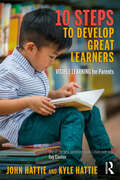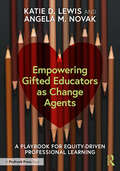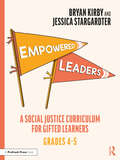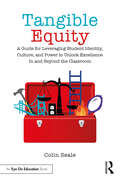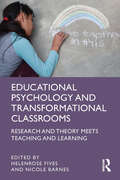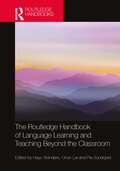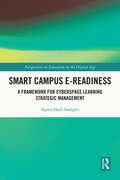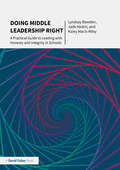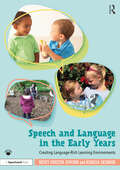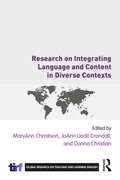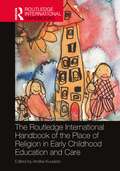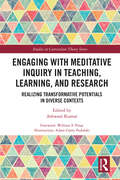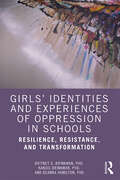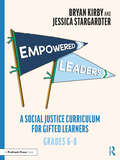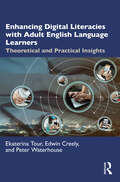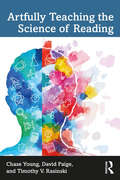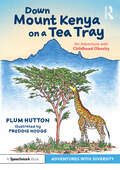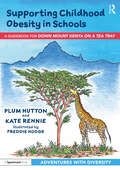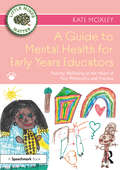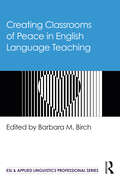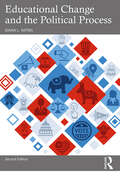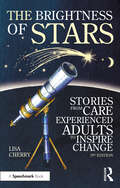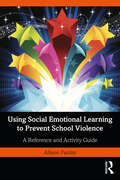- Table View
- List View
10 Steps to Develop Great Learners: Visible Learning for Parents
by John Hattie Kyle HattieWhat can concerned parents and carers do to ensure their children, of all ages, develop great learning habits which will help them achieve their maximum at school and in life? This is probably one of the most important questions any parent can ask and now John Hattie, one of the most respected and renowned Education researchers in the world draws on his globally famous Visible Learning research to provide some answers. Writing this book with his own son Kyle, himself a respected teacher, the Hatties offer a 10-step plan to nurturing curiosity and intellectual ambition and providing a home environment that encourages and values learning. These simple steps based on the strongest of research evidence and packed full of practical advice can be followed by any parent or carer to support and enhance learning and maximize the potential of their children. Areas covered include: Communicating effectively with teachers Being the ‘first learner’ and demonstrating openness to new ideas and thinking Choosing the right school for your child Promoting the ‘language of learning’ Having appropriately high expectations and understanding the power of feedback Anyone concerned about the education and development of our children should read this book. For parents it is an essential guide that could make a vital difference to your child's life. For schools, school leaders and education authorities this is a book you should be encouraging every parent to read to support learning and maximize opportunities for all.
Empowering Gifted Educators as Change Agents: A Playbook for Equity-Driven Professional Learning
by Katie D. Lewis Angela M. NovakThrough an accessible, research-based program of professional learning, this critical resource empowers gifted educators to become change agents for equity in their classroom, school, or district. Designed for practitioners seeking to increase the rate of identification and retention of underserved gifted populations, this book guides readers through the Four Zones of Equity-Driven Professional Learning Model, a practical set of tools specific to the field of gifted education. Readers will develop an all-inclusive professional learning plan specific to their teachers’ understanding of cultural norms, guiding participants to gain insight into the characteristics of gifted marginalized students, coaching faculty in ways to increase classroom support, and equipping educators with the tools necessary to build effective partnerships with parents and communities. Ideal for gifted educators, coordinators, and administrators, this playbook is packed with practical ideas, strategies, and activities to bring meaningful, equity-driven professional learning to life.
Empowering Gifted Educators as Change Agents: A Playbook for Equity-Driven Professional Learning
by Katie D. Lewis Angela M. NovakThrough an accessible, research-based program of professional learning, this critical resource empowers gifted educators to become change agents for equity in their classroom, school, or district.Designed for practitioners seeking to increase the rate of identification and retention of underserved gifted populations, this book guides readers through the Four Zones of Equity-Driven Professional Learning Model, a practical set of tools specific to the field of gifted education. Readers will develop an all-inclusive professional learning plan specific to their teachers’ understanding of cultural norms, guiding participants to gain insight into the characteristics of gifted marginalized students, coaching faculty in ways to increase classroom support, and equipping educators with the tools necessary to build effective partnerships with parents and communities.Ideal for gifted educators, coordinators, and administrators, this playbook is packed with practical ideas, strategies, and activities to bring meaningful, equity-driven professional learning to life.
Empowered Leaders: A Social Justice Curriculum for Gifted Learners, Grades 4-5
by Bryan Kirby Jessica StargardterEmpowered Leaders provides educators with a practical guide for incorporating critical social justice themes into enrichment programming for gifted students in grades 4-5. Featuring options for differentiation, digital learning, and talent development, each chapter offers detailed lesson plans and activities based around grade level themes that build as the students progress through middle school. Accessible and reader-friendly, lessons are student-centered and designed to foster globally conscious thought, empathetic discourse, and sustainable problem-solving skills. Ideal for individual, co-teaching, or small group programs, this helpful resource equips teachers with the tools to incorporate social justice into any subject or classroom. National Association for Gifted Children (NAGC) Curriculum Network Annual Curriculum Award 2020
Tangible Equity: A Guide for Leveraging Student Identity, Culture, and Power to Unlock Excellence In and Beyond the Classroom
by Colin SealeMove beyond the "why" of equity and learn what it actually looks like in the classroom. This powerful book by bestselling author Colin Seale shows how you can overcome barriers and create sustainable pathways to realizing equity for your students. Part I of the book explains why all education stakeholders should not just prioritize equity, but go beyond the buzzwords. Part II looks at why good intentions aren’t enough, and provides six ways you can leverage your power to really start doing something about equity. Part III discusses the five classroom-level philosophical shifts needed to make real change, including how to think differently about gifted education and achievement gaps. Finally, Part IV offers a variety of practical strategies for making equity real in your classrooms, no matter what grade level or subject area you teach. Throughout each chapter, you’ll find stories, examples, and research to bring the ideas to life. With the concrete suggestions in this book, you’ll be able to overcome deficit models, focus on opportunities for academic success and educational justice, and make equity tangible for each of your students.
Educational Psychology and Transformational Classrooms: Research and Theory Meets Teaching and Learning
by Helenrose Fives Nicole BarnesEducational Psychology and Transformational Classrooms uniquely positions teachers’ transformational experiences as central to understanding and implementing educational psychology research. Across three well-developed case studies using narrative inquiry methods, this volume explores moments of significant change, learning, and evolution in teaching and learning. Each case is followed by analyses from educational psychologists focusing on the three central actors in the learning experience—students, teacher, and context—and is then concluded with case authors’ responses to the analyses provided. Showcasing the holistic experience of teaching before unpacking it with theory and research, this book centers classroom life and posits educational psychology as an ideal and accessible lens for its examination.
The Routledge Handbook of Language Learning and Teaching Beyond the Classroom (Routledge Handbooks in Applied Linguistics)
by Hayo ReindersInformal language learning beyond the classroom plays an important and growing role in language learning and teaching. This Handbook brings together the existing body of research and unites the various disciplines that have explored this area, in order to present the current state of knowledge in one accessible resource. Much of adult learning takes place outside of formal education and for language learning, it is likely that out-of-class experiences play an equally important role. It is therefore surprising that the role of informal language learning has received little attention over the years, with the vast majority of research instead focusing on the classroom. Researchers from a range of backgrounds, however, have started to realise the important contribution of informal language learning, both in its own right, and in its relationship with classroom learning. Studies in the areas of learner autonomy, learning strategies, study abroad, language support, learners’ voices, computer-mediated communication, mobile-assisted language learning, digital gaming, and many others, all add to our understanding of the complex and intersecting ways in which learners construct their own language learning experiences, drawing from a wide range of resources, including materials, teachers, self-study, technology, other learners and native speakers. This Handbook provides a sound and comprehensive basis for researchers and graduate students to build upon in their own research of language learning and teaching beyond the classroom.
Smart Campus E-Readiness: A Framework for Cyberspace Learning Strategic Management (Perspectives on Education in the Digital Age)
by Sayed Hadi SadeghiThis book discusses the concept of the smart campus and e-learning practice in tertiary education, showing the relevance of the smart campus to the current learning environment. It provides a pedagogical framework for good practice in smart university campuses. The book outlines the interdisciplinary concept of the smart campus and draws on technology, education, and learning sciences to show how the smart campus can best work. It examines e-practice assessment in three different contexts, namely the United States, Australia, and Iran, from the perspective of administrators, faculty members, and students. Using this international comparative analysis, the book determines the existing advantages and disadvantages of existing e-learning systems. It offers a framework for researchers and developers to accelerate and assess the readiness of current campuses to optimize teaching, learning, and research at the university. This highly topical book will be essential reading for researchers, scholars, and post-graduate students in the fields of educational technology, digital education, higher education, and e-learning. It will also be useful for higher education instructors and university administrators to understand how smart campus knowledge can be integrated with other learning and teaching experiences.
Doing Middle Leadership Right: A Practical Guide to Leading with Honesty and Integrity in Schools
by Kaley Macis-Riley Lyndsay Bawden Jade HickinAre you a new or aspiring middle leader? Or have you been doing the job for a while but want some practical tips to ease workload and support your staff? This book draws together real experiences of middle leadership, both good and bad, and offers practical tips to help you find your voice, support your team, act with integrity and work with the Senior Leadership Team to improve your school. Covering all aspects of middle leadership including leadership styles, pedagogical approaches, the role of social media, how to tackle difficult conversations, staff wellbeing and much more, the authors will help you avoid common pitfalls, navigate highs and lows, and develop a school environment that enables both students and staff to flourish. For any new, experienced or prospective middle-leader Doing Middle Leadership Right provides a professional insight into how to lead with humanity at the centre of your practice. It puts staff and their wellbeing first – focussing not only on how to have the highest standards for both students and staff but also how to lead ethically.
Speech and Language in the Early Years: Creating Language-Rich Learning Environments
by Rebecca Skinner Becky Poulter JewsonSpeech and Language in the Early Years is an accessible resource, packed full of practical ideas and techniques to support speech and language development in young children. Learning to communicate is a dynamic process. A child needs a reason to communicate, the motivation to communicate, and, significantly, a responsive communication partner. This book will help you to develop language-rich interactions to facilitate language development in your everyday work and will encourage reflective practice in your setting. Key features include: Activities and strategies designed for busy educators to dip in and out of as part of everyday practice, promoting speech and language development as well as supporting those with speech, language, and communication needs Templates and techniques for reflective practice, supporting the creation of language-rich environments and encouraging mindful communication Chapters spanning from birth to the transition to school, each exploring different areas of the learning environment Offering readers the opportunity to extend their skills and confidence in their practice, this book is an essential resource for early years practitioners looking to facilitate quality interactions with the children in their care.
Research on Integrating Language and Content in Diverse Contexts (Global Research on Teaching and Learning English)
by Donna Christian MaryAnn Christison JoAnn Jodi CrandallCo-published with The International Research Foundation for English Language Education (TIRF), the ninth volume in the Global Research on Teaching and Learning English series presents research on the practice of integrating content and language in diverse contexts where English is used as a medium of instruction. With chapters written by TIRF Doctoral Dissertation Grant awardees and other scholars, the volume offers an overview of a wide range of methodological approaches to teaching content in English to English learners and examines factors that impede or contribute to effective instruction. The chapters include findings from original empirical research, as well as overviews of existing research and model programs, providing valuable insights and taking into account a multitude of contextual features. Offering up-to-date research on integrating language and content at the primary, secondary, and postsecondary levels, this book familiarizes readers with the latest advances in theory and practice. It is a key text for teacher education courses for preservice teachers, a resource for professional development programs for practicing teachers, and a useful reference for researchers.
The Routledge International Handbook of the Place of Religion in Early Childhood Education and Care (Routledge International Handbooks of Education)
by Arniika KuusistoUnderstanding the place of religion in Early Childhood Education and Care is of critical importance for the development of cultural literacy and plays a key role in societal coherence and inclusion. This international handbook provides a comprehensive overview of the place of religion in the societal educational arenas of the very youngest children across the globe. Drawing together contributions from leading international experts across disciplinary backgrounds, it offers a critical view of how to approach the complexities around the place of religion in Early Childhood Education and Care. Through its four parts, the book examines the theoretical, methodological, policy and practice perspectives and explores the complex intersections of transmission of "cultural heritage" and "national values" with the diverse, changing societal contexts. Each chapter contributes to an increased understanding of how the place of religion in Early Childhood Education and Care can be understood across continents, countries and educational systems. The Routledge International Handbook of the Place of Religion in Early Childhood Education and Care is an essential resource for academics, researchers, students and practitioners working in Early Childhood Education, Sociology of Childhood, Religious Education and other related fields
Engaging with Meditative Inquiry in Teaching, Learning, and Research: Realizing Transformative Potentials in Diverse Contexts (Studies in Curriculum Theory Series)
by Ashwani Kumar Adam Garry PodolskiThis collection of multi/inter-disciplinary essays explores the transformative potential of Ashwani Kumar’s work on meditative inquiry – a holistic approach to teaching, learning, researching, creating, and living – in diverse educational contexts. Aspiring to awaken awareness, intelligence, compassion, collaboration, and aesthetic sensibility among students and their teachers through self-reflection, critique, dialogue, and creative exploration, this volume: Showcases unique ways in which scholars from diverse disciplinary, cultural, and geographic contexts have engaged with meditative inquiry in their own fields. Provides a space where African, Asian, Buddhist, Indigenous, and Western scholars engage with the idea of meditative inquiry from their own cultural, philosophical, and spiritual traditions, perspectives, and practices. Explores a variety of themes in relation to meditative inquiry including arts-based research, poetic inquiry, Africentricity, Indigenous thinking, martial arts, positive psychology, trauma, dispute resolution, and critical discourse analysis. Offers insights into how the principles of meditative inquiry can be incorporated in classrooms and, thereby, contributes to the growing interest in mindfulness, meditation, and other holistic approaches in schools and academia. The diverse and rich contributions contained in this volume offer valuable perspectives and practices for scholars, students, and educators interested in exploring and adopting the principles of meditative inquiry in their specific fields and contexts.
Girls’ Identities and Experiences of Oppression in Schools: Resilience, Resistance, and Transformation
by Britney G. Brinkman Kandie Brinkman Deanna HamiltonThis book uses an intersectional approach to explore the ways in which girls and adults in school systems hold multiple realities, negotiate tensions, cultivate hope and resilience, resist oppression, and envision transformation. Rooted in the voices and lived experiences of girls and educators, Brinkman, Brinkman and Hamilton document girl-led activism within and outside schools, and explore how adults working with girls can help contribute toward them thriving. Girls’ narratives are considered through an intersectionality framework, in which gender identity, race, ethnicity, social class, sexual orientation, and other aspects of social identity intersect to inform girls' lived experiences. Exploring data and interviews collected over a 15-year period, the authors set out a three-part structure to outline how girls engage in strategies to enact resilience, resistance, and transformation. Part one reconceptualizes traditional definitions of resilience and documents girls’ experiences of oppression within schools, identifying common stereotypes about girls and examining the complexity of girls’ "choices" within systems that they do not feel they can change. Part two highlights girls’ active resistance to stereotypes, pressures to conform, and interpersonal and systemic discrimination, from entitlement of their boy peers to experiences of sexualization in school. Part three illuminates pathways for educational transformation, creating new possibilities for educational practices. Offering a range of pedagogies, policies, and practices educators can adopt to engage in systemic change, this is fascinating reading for professionals such as educators, counsellors, social workers, and policy makers, as well as academics and students in social, developmental, and educational psychology.
Empowered Leaders: A Social Justice Curriculum for Gifted Learners, Grades 6-8
by Bryan Kirby Jessica StargardterEmpowered Leaders provides educators with a practical guide for incorporating critical social justice themes into enrichment programming for gifted students in grades 6-8. Featuring options for differentiation, digital learning, and talent development, each chapter offers detailed lesson plans and activities based around grade level themes that build as the students progress through middle school. Accessible and reader-friendly, lessons are student-centered and designed to foster globally conscious thought, empathetic discourse, and sustainable problem-solving skills. Ideal for individual, co-teaching, or small group programs, this helpful resource equips teachers with the tools to incorporate social justice into any subject or classroom. National Association for Gifted Children (NAGC) Curriculum Network Annual Curriculum Award 2020
Enhancing Digital Literacies with Adult English Language Learners: Theoretical and Practical Insights
by Peter Waterhouse Edwin Creely Ekaterina TourOffering a new perspective on adult English language education, this book provides theoretical and practical insights into how digital literacies can be included in the learning programmes for newly arrived adults from migrant and refugee backgrounds. Enhancing Digital Literacies with Adult English Language Learners takes readers inside Langfield, an adult community-based English language centre that supports the settlement and learning of this vulnerable group. Drawing on a six-month ethnographic study of Langfield’s work, the book explores the approach to teaching digital literacies and presents a range of perspectives, including those of the adult learners, the teachers, and the organisation’s CEO. The chapters present a holistic view of teaching digital literacies in the adult English language context by exploring: adult learners’ digital literacy practices in everyday life and their learning at Langfield; teachers' beliefs and practices about digital literacies; and the support offered to them through institutional resources, leadership, and professional learning. The book identifies exemplary practices, as well as areas for further development in Langfield’s work and offers a range of implications for practice, policy, and research. Written in a detailed but accessible manner, this book contributes important insights into the strengths and needs of this unique and complex education sector. Addressing an area of uncertainty for many researchers, practitioners, leaders, and policy makers working within community-based learning contexts in Australia and internationally, this book will be an essential resource.
Artfully Teaching the Science of Reading
by Timothy V. Rasinski Chase Young David PaigeThis inviting book is a bridge between two major strands of reading instruction that are often held in opposition: the science of reading and artful approaches to teaching reading. Although the current climate of literacy instruction positions these approaches as diametrically opposed, the authors Young, Paige, and Rasinski describe how teachers can use the science of reading to engage students in artful, engaging, and authentic instruction. The authors reveal how effective teaching is a dynamic process that requires agency and creativity and show how teachers make artful shifts based on the needs of students in specific contexts. Chapters include a range of examples and explanations of how artful teaching is integrated into reading instruction and how it can increase students’ motivation and positive attitudes toward reading. The concise and practical chapters cover key topics, including phonemic awareness, reading fluency, vocabulary, assessment, home and family reading, and more. This essential road map for all pre-service and in-service reading teachers restores the importance of teacher agency, supports the critical understanding of reading research, and allows teachers to use their knowledge, experience, and creative approaches in the classroom. This is the definitive guide to teaching reading as both an art and a science.
Down Mount Kenya on a Tea Tray: An Adventure with Childhood Obesity (Adventures with Diversity)
by Plum HuttonWesley had never thought much about his lifestyle or how he looked. He enjoyed eating his way through weekends in front of the telly with his mum. However, fate catapults him to a new life in East Africa and he is forced to face the negative impact that obesity is having on his life. When he rashly promises to climb Mount Kenya along with the rest of his class, an adventure in courage and determination begins . . . This entertaining story explores some of the challenges faced by obese children and young people. It highlights both the physical limitations as well as the psychological problems associated with obesity, such as social isolation and low mood. The story explores the complicated web of factors that might cause a child to become obese and identifies some of the life-altering changes that can come from a healthy diet and active lifestyle. Teaching lessons about kindness, friendship, bravery and determination, this is powerful reading for all children. It operates as a stand-alone story and is also available as part of a set along with a supporting guide.
Supporting Childhood Obesity in Schools: A Guidebook for 'Down Mount Kenya on a Tea Tray' (Adventures with Diversity)
by Plum Hutton Kate RennieThis guidebook, designed to be used alongside the storybook Down Mount Kenya on a Tea Tray, has been created to inform readers about the physical, social and psychological impacts of childhood obesity. Created for busy parents, teachers and professionals, this book is founded upon recent research and written in an engaging and accessible style. Chapters explain the surprisingly complex causes of childhood obesity and highlight that children often have little control over the factors that may lead them to become obese. The physical and psychological consequences of obesity are explored and strategies suggested, ranging from individual and family support to changes that need to be made at a societal level to tackle this significant public health issue. Key features include: • an accessible guide to childhood obesity • chapter-by-chapter discussion points for use with Down Mount Kenya on a Tea Tray to encourage open and honest conversations about childhood obesity and its effects • strategies to support obese children and their families to sustain positive lifestyle changes. This is an essential resource for parents, teachers and other professionals looking to understand childhood obesity and support children aged 8–12.
A Guide to Mental Health for Early Years Educators: Putting Wellbeing at the Heart of Your Philosophy and Practice (Little Minds Matter)
by Kate MoxleyThis practical and accessible guide tackles the challenges that busy childcare educators face with their mental health in what is a wonderful, rewarding, but often exhausting role. Drawing from "day-in-the-life" experiences and case studies, this book sets out high-quality staff wellbeing practices that can revolutionise the way childcare practitioners approach their job and their own health. Chapters guide the reader through a process of reflection and development, encouraging and empowering them to create a workplace culture that positively contributes to their personal wellbeing. This book: • Focuses on the realities of Early Years education, combining the author's lived experience with examples of real-life practice • Encourages educators to think and feel positively about themselves; to identify the individual skills, strengths and talents they bring to their work • Can be used individually or collaboratively by team members, with guidance on creating a positive workplace culture with a shared vision, core values and beliefs. Essential reading for anybody who finds that the job they love can sometimes leave them feeling worn out, stressed and depleted, this book has been written to enrich the lives of all training and practising Early Years Educators.
Creating Classrooms of Peace in English Language Teaching (ESL & Applied Linguistics Professional Series)
by Barbara M. BirchTimely and accessible, this edited volume brings together leading scholars to discuss methods for supporting reconciliation, peace, and sustainable and social change in English language teaching. Around the world, peace and reconciliation are urgent themes that are inextricably connected to the study and practice of teaching English. The book features a diversity of voices and addresses pedagogies of peace, universal responsibility, and global interdependence in the domain of English language education. Organized in three strands, Part 1 addresses policy and implementation, Part 2 addresses teacher education, and Part 3 addresses content and lesson planning. With chapters drawn from a dozen countries and contexts, this book paves the way for English language teachers to harness their social capital and pedagogical agency to create sustainable peace globally and locally, and in and outside the classroom. It is essential reading for scholars and students in TESOL, applied linguistics, and peace education.
Educational Change and the Political Process
by Dana L. MitraEducational Change and the Political Process brings together key ideas on both the system of educational policy and the policy process in the United States. It provides students with a broad, methodical understanding of educational policy. No other textbook offers as comprehensive a view of the US educational policy procedure and political systems. Section I discusses the actors and systems that create and implement policy on both the federal and the local level; Section II walks students through the policy process from idea to implementation to evaluation; and Section III delves into three major forces driving the creation of educational policies in the current era—accountability, equity, and market-driven reforms. Each chapter provides case studies, discussion questions, and classroom activities to scaffold learning, as well as a bibliography for further reading to deepen exploration of these topics. This new edition will explore recent Trump-era and post-Trump era US politics and policy changes as well as the politics of race.
The Brightness of Stars: Stories Of Adults Who Came Through The Care System
by Lisa CherryIn this poignant book, Lisa Cherry brings together a collection of candid and personal reflections on the care system in the UK, offering alternative ways of thinking about the care experience, supporting better ways of working, and providing justification for a trauma-informed lens to be applied to all forms of work with those in care. Through personal insights and reflections, the book brings often-unheard stories vividly to life, beginning with the author’s own. These are stories about love and pain; hurt and isolation; the depth of lived experience that makes up a life; how we live our lives through our relationships with others and where we feel we fit in. In this thoughtfully compiled third edition, original contributors look back on their own reflections from the lives that they live now, new stories bring new perspectives, and discussion points provide the opportunity to consider the realities of the care experience as well as life beyond. Whilst each story is unique, shared themes reveal the truth of the care system and, coming at a time where there is a real opportunity for change, the narratives in this book are ultimately stories of hope and connection. This is crucial reading for policy makers, those working in social work, education and adoption, as well as care experienced adults.
The Brightness of Stars: Stories from Care Experienced Adults to Inspire Change
by Lisa CherryIn this poignant book, Lisa Cherry brings together a collection of candid and personal reflections on the care system in the UK, offering alternative ways of thinking about the care experience, supporting better ways of working, and providing justification for a trauma-informed lens to be applied to all forms of work with those in care.Through personal insights and reflections, the book brings often-unheard stories vividly to life, beginning with the author’s own. These are stories about love and pain; hurt and isolation; the depth of lived experience that makes up a life; how we live our lives through our relationships with others and where we feel we fit in. In this thoughtfully compiled third edition, original contributors look back on their own reflections from the lives that they live now, new stories bring new perspectives, and discussion points provide the opportunity to consider the realities of the care experience as well as life beyond.Whilst each story is unique, shared themes reveal the truth of the care system and, coming at a time where there is a real opportunity for change, the narratives in this book are ultimately stories of hope and connection. This is crucial reading for policy makers, those working in social work, education and adoption, as well as care experienced adults.
Using Social Emotional Learning to Prevent School Violence: A Reference and Activity Guide
by Allison PaoliniUsing Social Emotional Learning to Prevent School Violence is an essential resource that seeks to close the existing gap in literature on ways to mitigate school violence, as well as to advocate for the integration of social emotional learning in schools. In an effort to create culturally responsive, student-centered, and secure school environments, this book outlines strategies that highlight the importance of collaboration between critical stakeholders in identifying and mitigating bullying, assisting students struggling with relationship building skills, grief and loss, and anger; particularly those that demonstrate the need for power and control or the desire for retaliation. Mental health issues are also taken into consideration. Proactive responses and best practices are exemplifed in order to equip struggling students with resources that foster their well-being and success. Dr. Paolini draws upon extensive research in her depiction of school violence in America’s education system and designs lesson plans and activities that address and align with each of the social emotional learning core competencies for both elementary and secondary school counselors. This book will be of interest to critical stakeholders in P-12 settings as well as those in higher education, particularly as a resource for graduate students training to become transformative school counselors.
